IEEE Standard for a Convergent
Digital Home Network for
Heterogeneous Technologies
Amendment 1: Support of New
MAC/PHYs and Enhancements
IEEE Communications Society
Sponsored by the
Power Line Communications Committee
IEEE
3 Park Avenue
New York, NY 10016-5997
USA
IEEE Std 1905.1a™-2014
(Amendment to
IEEE Std 1905.1™-2013)
Authorized licensed use limited to: National University of Singapore. Downloaded on September 24,2015 at 00:38:06 UTC from IEEE Xplore. Restrictions apply.
�
Authorized licensed use limited to: National University of Singapore. Downloaded on September 24,2015 at 00:38:06 UTC from IEEE Xplore. Restrictions apply.
�
IEEE Std 1905.1a™-2014
(Amendment to
IEEE Std 1905.1™-2013)
IEEE Standard for a Convergent
Digital Home Network for
Heterogeneous Technologies
Amendment 1: Support of New
MAC/PHYs and Enhancements
Sponsor
Power Line Communications Committee
of the
IEEE Communications Society
Approved 23 December 2014
IEEE-SA Standards Board
Authorized licensed use limited to: National University of Singapore. Downloaded on September 24,2015 at 00:38:06 UTC from IEEE Xplore. Restrictions apply.
�
Abstract: An abstraction layer for multiple home networking technologies that provides a
common interface to widely deployed home networking technologies is defined in this standard:
IEEE 1901™ over power lines, IEEE 802.11™ for wireless, Ethernet over twisted pair cable, and
MoCA 1.1 over coax. Additional network technologies are supported by an extensible mechanism
using an IEEE OUI and an XML-formatted document. Connectivity selection for transmission of
packets arriving from any interface or application is supported by the 1905 abstraction layer.
Modification to the underlying home networking technologies is not required by the 1905
abstraction layer, and hence it does not change the behavior or implementation of existing home
networking technologies. The 1905 abstraction layer is between layers 2 and 3 and abstracts the
individual details of each interface, aggregates available bandwidth, and facilitates seamless
integration. The 1905 abstraction layer also facilitates end-to-end quality of service (QoS) while
simplifying the introduction of new devices to the network, establishing secure connections,
extending network coverage, and facilitating advanced network management features including
discovery, path selection, autoconfiguration, and QoS negotiation.
Keywords: abstraction layer, access point (AP) autoconfiguration, data models, extensibility,
fragmentation and reassembly, Generic Phy, IEEE 802.1™ bridge discovery, IEEE Std 802.11™,
IEEE Std 1901™, IEEE Std 1905.1™, L2, MoCA®, pairwise master key, power management,
push button, registration, security, topology discovery protocol, Wi-Fi®, XML
•
The Institute of Electrical and Electronics Engineers, Inc.
3 Park Avenue, New York, NY 10016-5997, USA
Copyright © 2015 by The Institute of Electrical and Electronics Engineers, Inc.
All rights reserved. Published 20 February 2015. Printed in the United States of America.
IEEE is a registered trademark in the U.S. Patent & Trademark Office, owned by The Institute of Electrical and Electronics
Engineers, Incorporated.
MoCA is a registered trademark in the U.S. Patent & Trademark Office, owned by the Multimedia over Coax Alliance.
Wi-Fi and WPA are registered trademarks in the U.S. Patent & Trademark Office, owned by the Wi-Fi Alliance.
PDF:
Print:
IEEE prohibits discrimination, harassment and bullying.
For more information, visit http://www.ieee.org/web/aboutus/whatis/policies/p9-26.html.
No part of this publication may be reproduced in any form, in an electronic retrieval system or otherwise, without the prior written permission
of the publisher.
ISBN 978-0-7381-9496-7
ISBN 978-0-7381-9497-4
STD20086
STDPD20086
Authorized licensed use limited to: National University of Singapore. Downloaded on September 24,2015 at 00:38:06 UTC from IEEE Xplore. Restrictions apply.
�
Important Notices and Disclaimers Concerning IEEE Standards Documents
IEEE documents are made available for use subject to important notices and legal disclaimers. These
notices and disclaimers, or a reference to this page, appear in all standards and may be found under the
heading “Important Notice” or “Important Notices and Disclaimers Concerning IEEE Standards
Documents.”
Notice and Disclaimer of Liability Concerning the Use of IEEE Standards
Documents
IEEE Standards documents (standards, recommended practices, and guides), both full-use and trial-use, are
developed within IEEE Societies and the Standards Coordinating Committees of the IEEE Standards
Association (“IEEE-SA”) Standards Board. IEEE (“the Institute”) develops its standards through a
consensus development process, approved by the American National Standards Institute (“ANSI”), which
brings together volunteers representing varied viewpoints and interests to achieve the final product.
Volunteers are not necessarily members of the Institute and participate without compensation from IEEE.
While IEEE administers the process and establishes rules to promote fairness in the consensus development
process, IEEE does not independently evaluate, test, or verify the accuracy of any of the information or the
soundness of any judgments contained in its standards.
IEEE does not warrant or represent the accuracy or content of the material contained in its standards, and
expressly disclaims all warranties (express, implied and statutory) not included in this or any other
document relating to the standard, including, but not limited to, the warranties of: merchantability; fitness
for a particular purpose; non-infringement; and quality, accuracy, effectiveness, currency, or completeness
of material. In addition, IEEE disclaims any and all conditions relating to: results; and workmanlike effort.
IEEE standards documents are supplied “AS IS” and “WITH ALL FAULTS.”
Use of an IEEE standard is wholly voluntary. The existence of an IEEE standard does not imply that there
are no other ways to produce, test, measure, purchase, market, or provide other goods and services related
to the scope of the IEEE standard. Furthermore, the viewpoint expressed at the time a standard is approved
and issued is subject to change brought about through developments in the state of the art and comments
received from users of the standard.
In publishing and making its standards available, IEEE is not suggesting or rendering professional or other
services for, or on behalf of, any person or entity nor is IEEE undertaking to perform any duty owed by any
other person or entity to another. Any person utilizing any IEEE Standards document, should rely upon his
or her own independent judgment in the exercise of reasonable care in any given circumstances or, as
appropriate, seek the advice of a competent professional in determining the appropriateness of a given
IEEE standard.
IN NO EVENT SHALL IEEE BE LIABLE FOR ANY DIRECT, INDIRECT, INCIDENTAL, SPECIAL,
EXEMPLARY, OR CONSEQUENTIAL DAMAGES (INCLUDING, BUT NOT LIMITED TO:
PROCUREMENT OF SUBSTITUTE GOODS OR SERVICES; LOSS OF USE, DATA, OR PROFITS;
OR BUSINESS INTERRUPTION) HOWEVER CAUSED AND ON ANY THEORY OF LIABILITY,
WHETHER IN CONTRACT, STRICT LIABILITY, OR TORT (INCLUDING NEGLIGENCE OR
OTHERWISE) ARISING IN ANY WAY OUT OF THE PUBLICATION, USE OF, OR RELIANCE
UPON ANY STANDARD, EVEN IF ADVISED OF THE POSSIBILITY OF SUCH DAMAGE AND
REGARDLESS OF WHETHER SUCH DAMAGE WAS FORESEEABLE.
Translations
The IEEE consensus development process involves the review of documents in English only. In the event
that an IEEE standard is translated, only the English version published by IEEE should be considered the
approved IEEE standard.
Authorized licensed use limited to: National University of Singapore. Downloaded on September 24,2015 at 00:38:06 UTC from IEEE Xplore. Restrictions apply.
�
Official statements
A statement, written or oral, that is not processed in accordance with the IEEE-SA Standards Board
Operations Manual shall not be considered or inferred to be the official position of IEEE or any of its
committees and shall not be considered to be, or be relied upon as, a formal position of IEEE. At lectures,
symposia, seminars, or educational courses, an individual presenting information on IEEE standards shall
make it clear that his or her views should be considered the personal views of that individual rather than the
formal position of IEEE.
Comments on standards
Comments for revision of IEEE Standards documents are welcome from any interested party, regardless of
membership affiliation with IEEE. However, IEEE does not provide consulting information or advice
pertaining to IEEE Standards documents. Suggestions for changes in documents should be in the form of a
proposed change of text, together with appropriate supporting comments. Since IEEE standards represent a
consensus of concerned interests, it is important that any responses to comments and questions also receive
the concurrence of a balance of interests. For this reason, IEEE and the members of its societies and
Standards Coordinating Committees are not able to provide an instant response to comments or questions
except in those cases where the matter has previously been addressed. For the same reason, IEEE does not
respond to interpretation requests. Any person who would like to participate in revisions to an IEEE
standard is welcome to join the relevant IEEE working group.
Comments on standards should be submitted to the following address:
Secretary, IEEE-SA Standards Board
445 Hoes Lane
Piscataway, NJ 08854 USA
Laws and regulations
Users of IEEE Standards documents should consult all applicable laws and regulations. Compliance with
the provisions of any IEEE Standards document does not imply compliance to any applicable regulatory
requirements. Implementers of the standard are responsible for observing or referring to the applicable
regulatory requirements. IEEE does not, by the publication of its standards, intend to urge action that is not
in compliance with applicable laws, and these documents may not be construed as doing so.
Copyrights
IEEE draft and approved standards are copyrighted by IEEE under U.S. and international copyright laws.
They are made available by IEEE and are adopted for a wide variety of both public and private uses. These
include both use, by reference, in laws and regulations, and use in private self-regulation, standardization,
and the promotion of engineering practices and methods. By making these documents available for use and
adoption by public authorities and private users, IEEE does not waive any rights in copyright to the
documents.
Photocopies
Subject to payment of the appropriate fee, IEEE will grant users a limited, non-exclusive license to
photocopy portions of any individual standard for company or organizational internal use or individual,
non-commercial use only. To arrange for payment of licensing fees, please contact Copyright Clearance
Center, Customer Service, 222 Rosewood Drive, Danvers, MA 01923 USA; +1 978 750 8400. Permission
to photocopy portions of any individual standard for educational classroom use can also be obtained
through the Copyright Clearance Center.
Authorized licensed use limited to: National University of Singapore. Downloaded on September 24,2015 at 00:38:06 UTC from IEEE Xplore. Restrictions apply.
�
Updating of IEEE Standards documents
Users of IEEE Standards documents should be aware that these documents may be superseded at any time
by the issuance of new editions or may be amended from time to time through the issuance of amendments,
corrigenda, or errata. An official IEEE document at any point in time consists of the current edition of the
document together with any amendments, corrigenda, or errata then in effect.
Every IEEE standard is subjected to review at least every ten years. When a document is more than ten
years old and has not undergone a revision process, it is reasonable to conclude that its contents, although
still of some value, do not wholly reflect the present state of the art. Users are cautioned to check to
determine that they have the latest edition of any IEEE standard.
the
issuance of amendments, corrigenda, or errata, visit
In order to determine whether a given document is the current edition and whether it has been amended
through
the IEEE-SA Website at
http://ieeexplore.ieee.org/xpl/standards.jsp or contact IEEE at the address listed previously. For more
information about the IEEE-SA or IEEE’s standards development process, visit the IEEE-SA Website at
http://standards.ieee.org.
Errata
Errata, if any, for all IEEE standards can be accessed on the IEEE-SA Website at the following URL:
http://standards.ieee.org/findstds/errata/index.html. Users are encouraged to check this URL for errata
periodically.
Patents
Attention is called to the possibility that implementation of this standard may require use of subject matter
covered by patent rights. By publication of this standard, no position is taken by the IEEE with respect to
the existence or validity of any patent rights in connection therewith. If a patent holder or patent applicant
has filed a statement of assurance via an Accepted Letter of Assurance, then the statement is listed on the
IEEE-SA Website at http://standards.ieee.org/about/sasb/patcom/patents.html. Letters of Assurance may
indicate whether the Submitter is willing or unwilling to grant licenses under patent rights without
compensation or under reasonable rates, with reasonable terms and conditions that are demonstrably free of
any unfair discrimination to applicants desiring to obtain such licenses.
Essential Patent Claims may exist for which a Letter of Assurance has not been received. The IEEE is not
responsible for identifying Essential Patent Claims for which a license may be required, for conducting
inquiries into the legal validity or scope of Patents Claims, or determining whether any licensing terms or
conditions provided in connection with submission of a Letter of Assurance, if any, or in any licensing
agreements are reasonable or non-discriminatory. Users of this standard are expressly advised that
determination of the validity of any patent rights, and the risk of infringement of such rights, is entirely
their own responsibility. Further information may be obtained from the IEEE Standards Association.
Authorized licensed use limited to: National University of Singapore. Downloaded on September 24,2015 at 00:38:06 UTC from IEEE Xplore. Restrictions apply.
�
Participants
At the time this amendment was submitted to the IEEE-SA Standards Board for approval, the Convergent
Digital Home Network Working Group had the following membership:
Purva Rajkotia, Chair
C. Scott Willy, Vice Chair
Stephen Palm, Editor
The following entities submitted technical contributions or commented on this amendment at various stages
of project development.
AT&T
Broadcom Corporation
Entropic Communications
HD-PLC Alliance
HomeGrid Forum
HomePlug Powerline Alliance
Huawei Technologies Co., Ltd
Institute for Information Industry
Marvell Semiconductor, Inc.
The following individuals submitted technical contributions or commented on this amendment at various
stages of project development.
Mstar Semiconductor, Inc
Multimedia over Coax Alliance (MoCA)
Orange
Panasonic Corporation of North America
Qingdao Eastsoft Communication Technology Co. Ltd.
Qualcomm Incorporated
Sigma Designs
STMicroelectronics
ZTE Corporation
Jim Allen
Avner Aloush
Mitch Aramaki
David Barr
Erez Ben-Tovim
Edith Berard
Les Brown
Matt Chen
Wu Chen
Philippe Christin
Chen Dong
John Egan
The following members of the entity balloting committee voted on this amendment. Balloters may have
voted for approval, disapproval, or abstention.
Jean-Philippe Faure
Rob Gelphman
Stephan Horvath
Xiaoye Hu
Jean-Philippe Javaudin
Tong Jiang
Philippe Klein
Avi Kliger
Nobutaka Kodama
Abdesselem Kortebi
Fangfang Liu
Marcos Martinez
Pascal Moniot
Stephen Palm
Purva Rajkotia
Rob Ranck
Martin Renard
Hai Shalom
Barbara Stark
Viviane Su
Mark Walters
Lin Wang
C. Scott Willy
Boshan Zhang
AT&T
Bright House Networks
Broadcom Corporation
D-Link Corporation
HD-PLC Alliance
HomeGrid Forum
HomePlug Powerline Alliance
Huawei Technologies Co., Ltd
Institute for Information Industry
Marvell Semiconductor, Inc.
Mstar Semiconductor, Inc
Multimedia over Coax Alliance (MoCA)
Nokia
Orange
Panasonic Corporation of North America
Qingdao Eastsoft Communication Technology Co. Ltd.
Qualcomm Incorporated
Sensus
Siemens Corporation
Sigma Designs
Sony Corporation
STMicroelectronics
ZTE Corporation
Copyright © 2015 IEEE. All rights reserved.
vi
Authorized licensed use limited to: National University of Singapore. Downloaded on September 24,2015 at 00:38:06 UTC from IEEE Xplore. Restrictions apply.
�
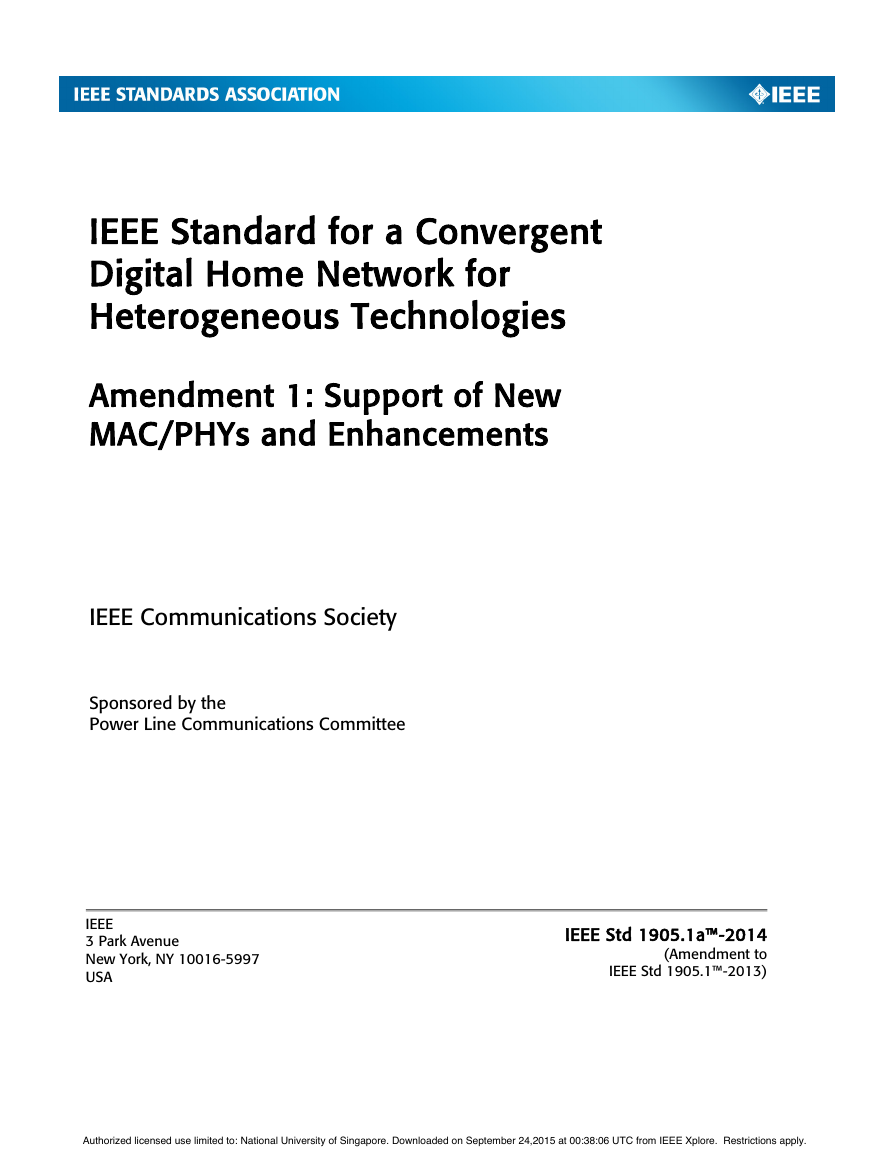
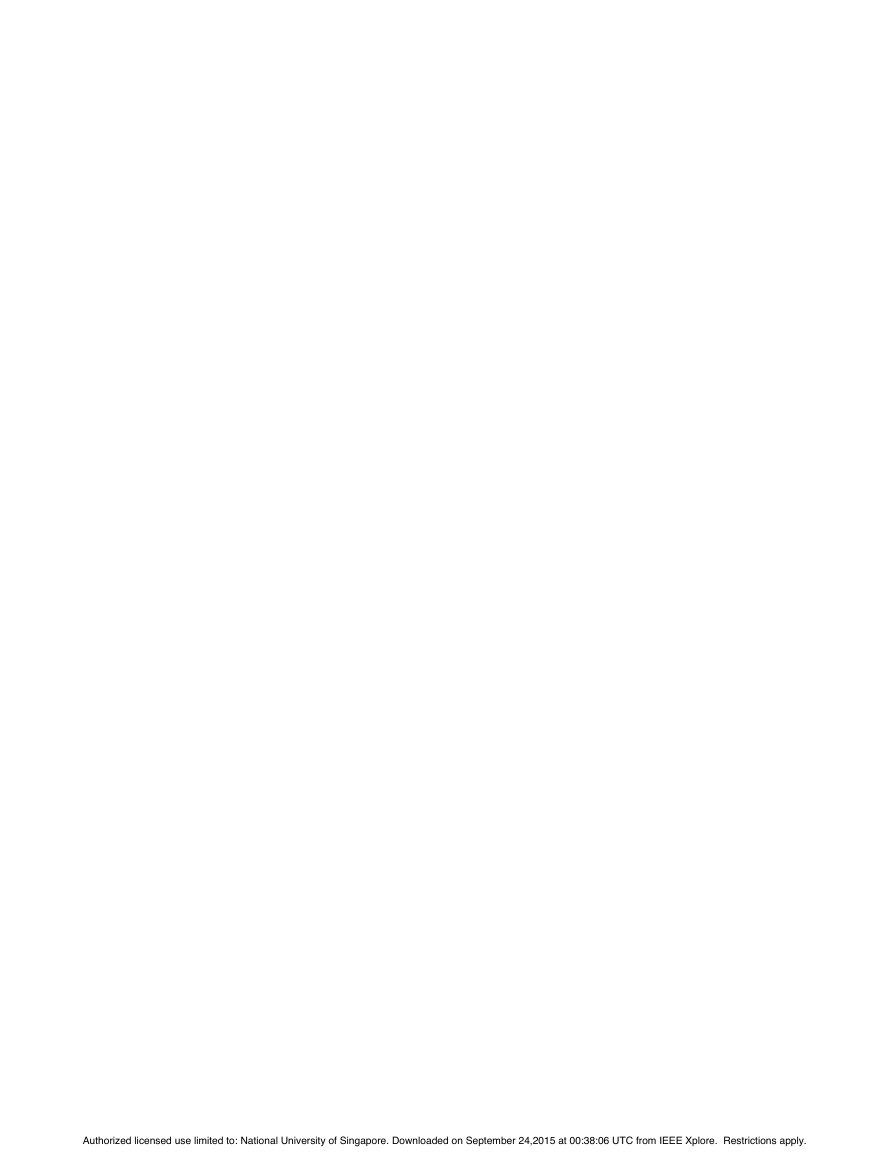
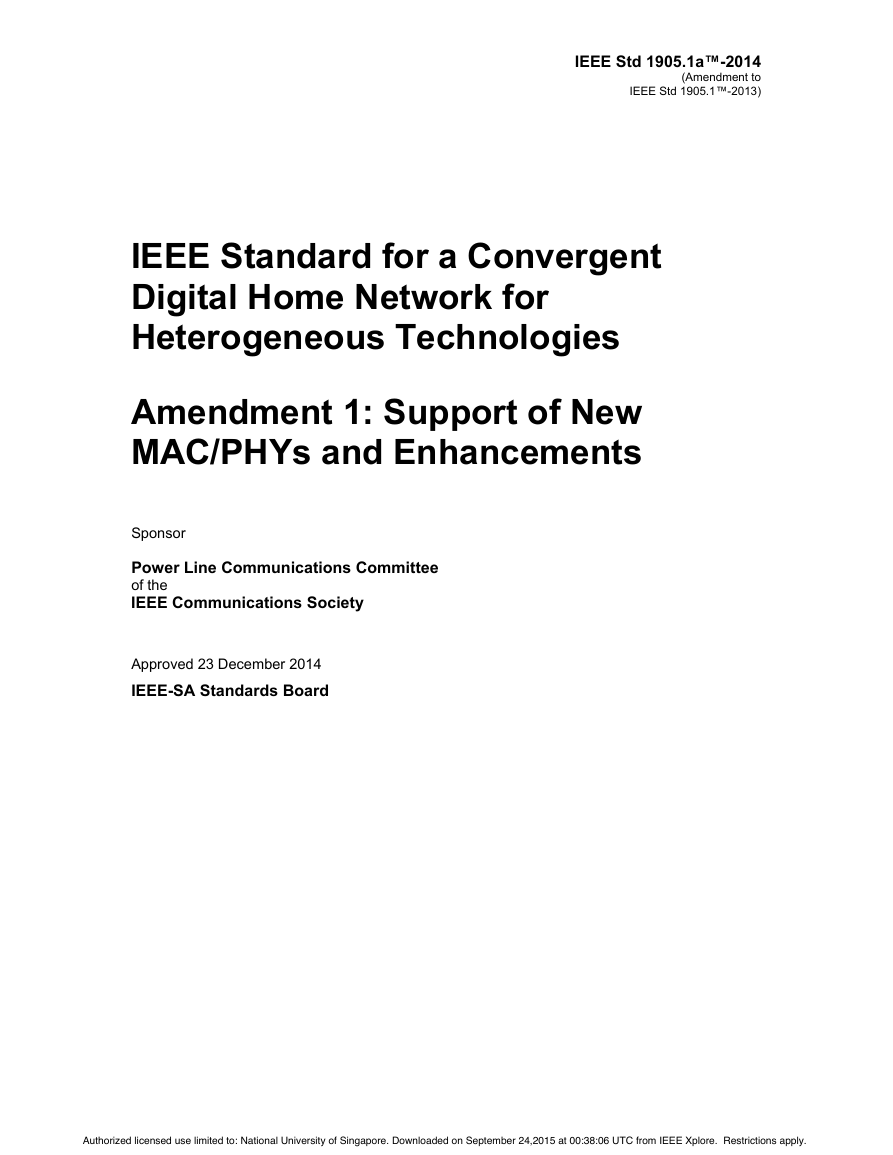
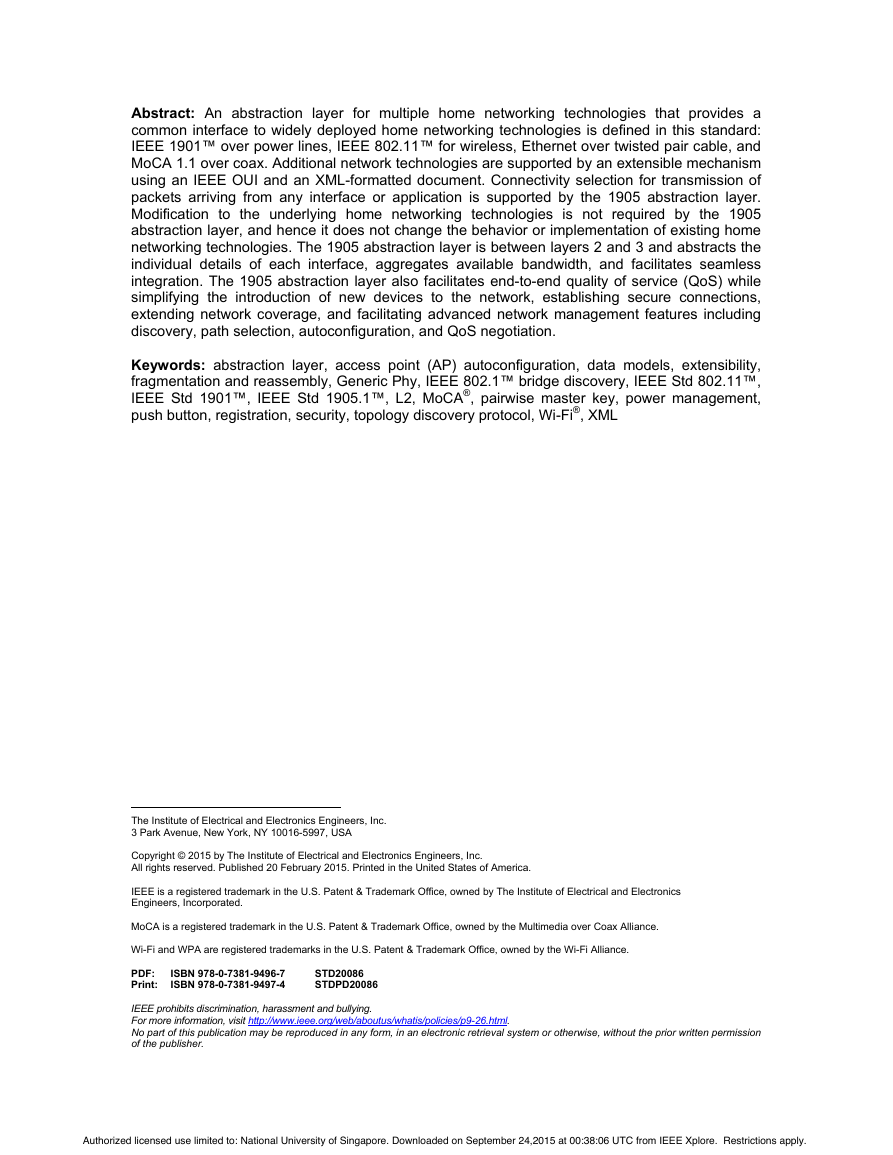
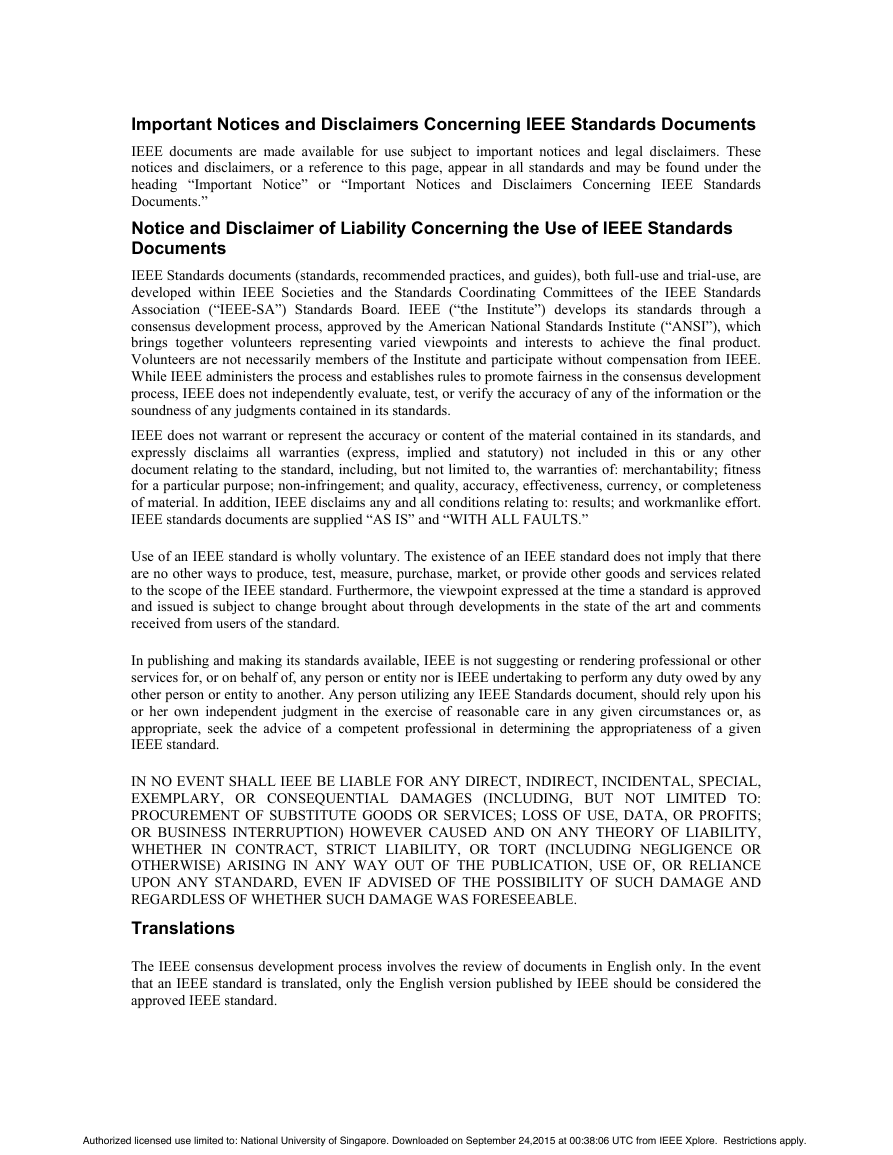
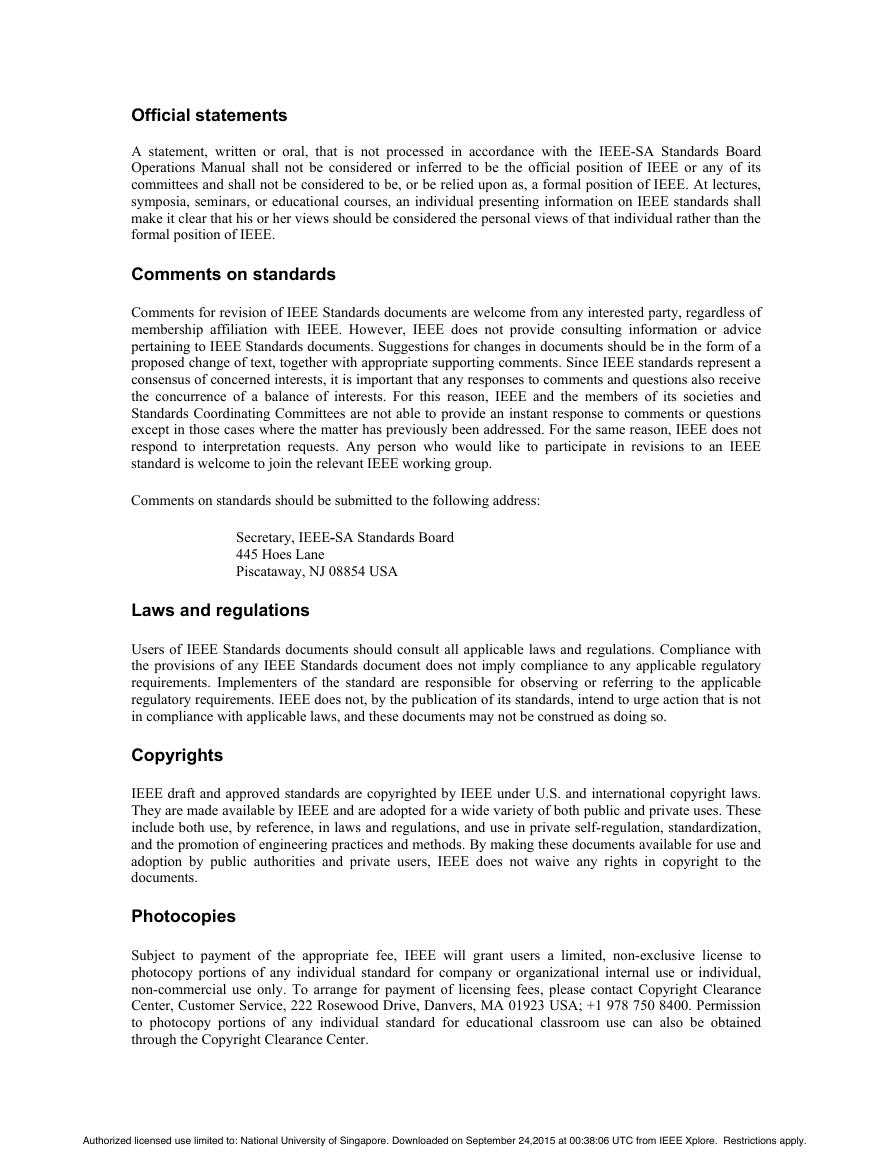
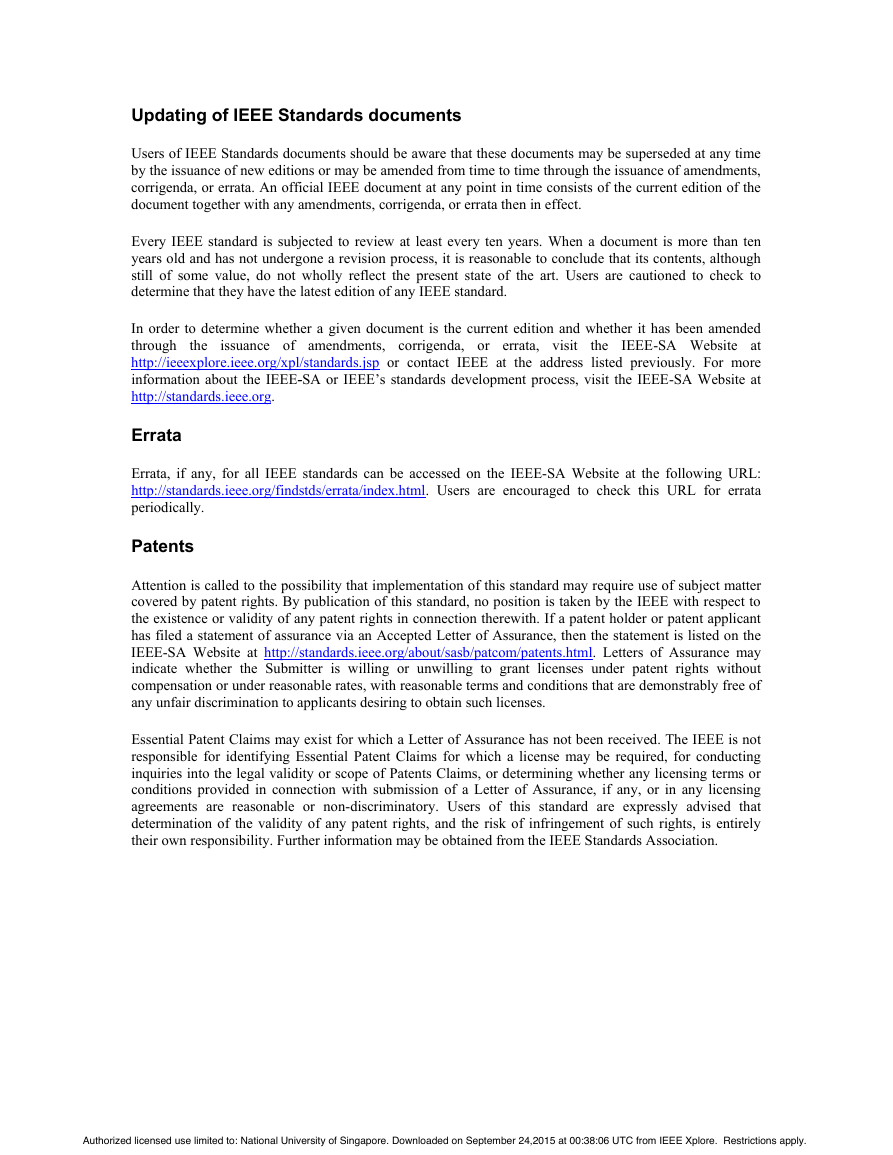
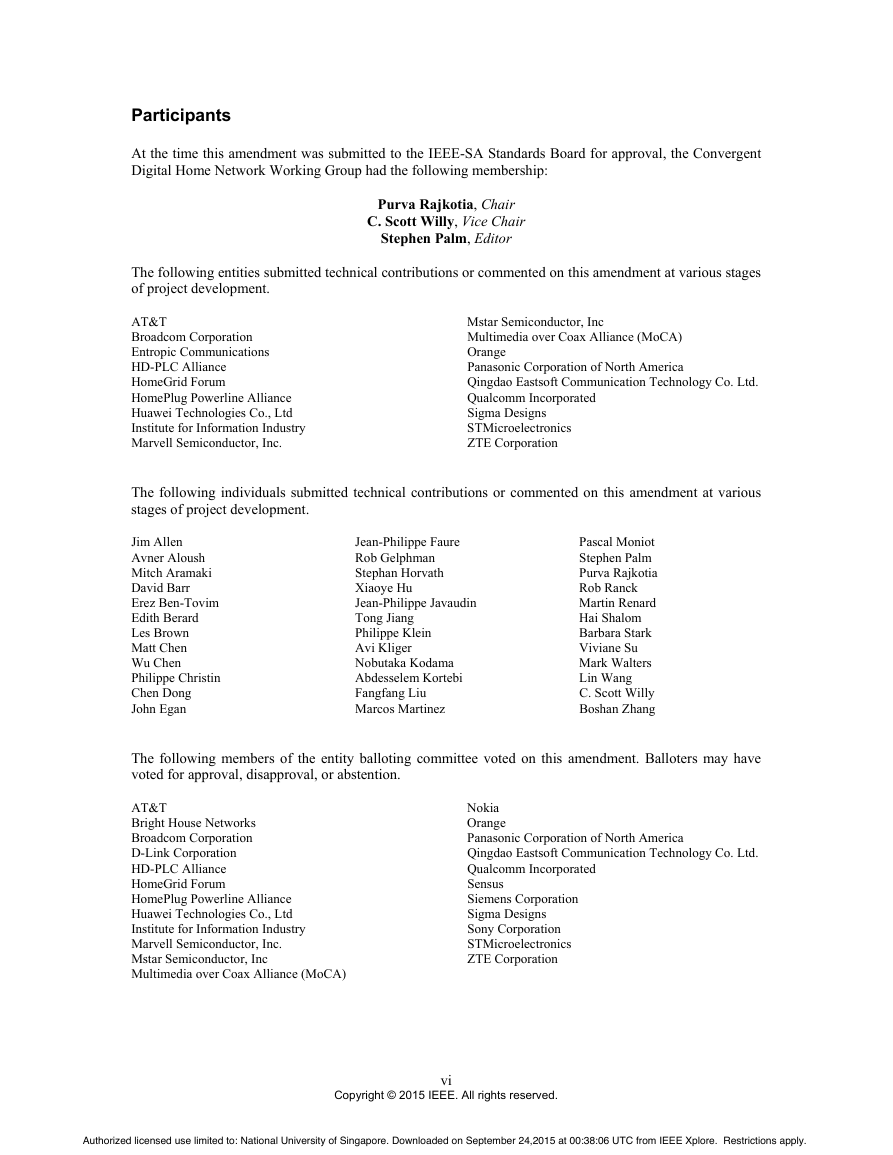








 2023年江西萍乡中考道德与法治真题及答案.doc
2023年江西萍乡中考道德与法治真题及答案.doc 2012年重庆南川中考生物真题及答案.doc
2012年重庆南川中考生物真题及答案.doc 2013年江西师范大学地理学综合及文艺理论基础考研真题.doc
2013年江西师范大学地理学综合及文艺理论基础考研真题.doc 2020年四川甘孜小升初语文真题及答案I卷.doc
2020年四川甘孜小升初语文真题及答案I卷.doc 2020年注册岩土工程师专业基础考试真题及答案.doc
2020年注册岩土工程师专业基础考试真题及答案.doc 2023-2024学年福建省厦门市九年级上学期数学月考试题及答案.doc
2023-2024学年福建省厦门市九年级上学期数学月考试题及答案.doc 2021-2022学年辽宁省沈阳市大东区九年级上学期语文期末试题及答案.doc
2021-2022学年辽宁省沈阳市大东区九年级上学期语文期末试题及答案.doc 2022-2023学年北京东城区初三第一学期物理期末试卷及答案.doc
2022-2023学年北京东城区初三第一学期物理期末试卷及答案.doc 2018上半年江西教师资格初中地理学科知识与教学能力真题及答案.doc
2018上半年江西教师资格初中地理学科知识与教学能力真题及答案.doc 2012年河北国家公务员申论考试真题及答案-省级.doc
2012年河北国家公务员申论考试真题及答案-省级.doc 2020-2021学年江苏省扬州市江都区邵樊片九年级上学期数学第一次质量检测试题及答案.doc
2020-2021学年江苏省扬州市江都区邵樊片九年级上学期数学第一次质量检测试题及答案.doc 2022下半年黑龙江教师资格证中学综合素质真题及答案.doc
2022下半年黑龙江教师资格证中学综合素质真题及答案.doc